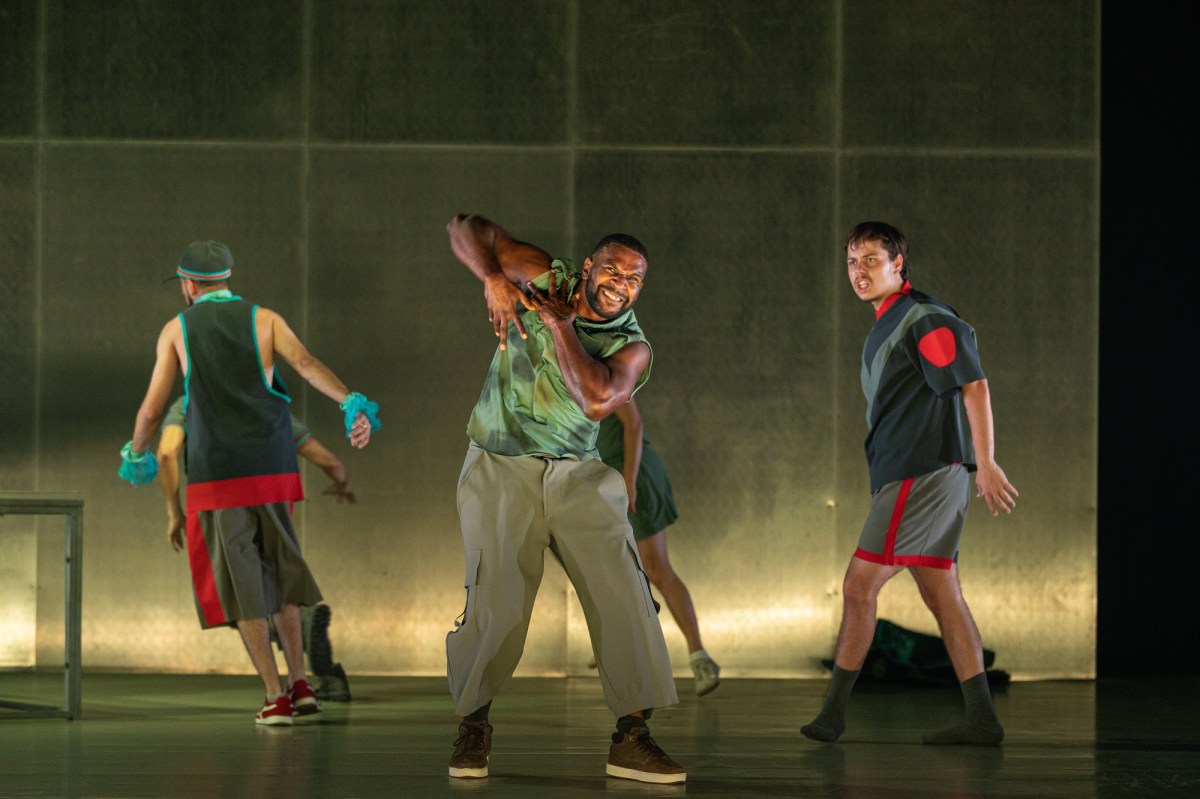Jurrungu Ngan-ga is the latest work by Broome/Sydney-based intercultural dance theatre company Marrugeku. The show makes a compelling link between the treatment of Indigenous Australians and asylum seekers in terms of their incarceration, brutalisation and deaths while in detention.
The title means ‘straight talk’ – a Yarawu concept that refers to direct and honest communication between family members. In the context of the show this takes the form of a frank and fearless conversation between Indigenous, refugee and settler populations, trans and CIS gendered subjects, prisoners and guards, performers and audience.
The work is informed by a similar process of ‘straight talk’ between creatives, performers and cultural dramaturgs. The latter include Yarawu elder and senator Patrick Dodson; Kurdish Iranian journalist, writer and former asylum seeker Behrouz Boochani (who was detained on Manus Island for five years); and Iranian-Australian philosopher and activist Omid Tofighian, who co-translated Boochani’s book No Friend But The Mountains (which was based on text messages from Manus Island). This book is one of two departure-points for Jurrungu Ngan-ga; the other is Australia’s Shame, the Four Corners documentary about the torture of Indigenous youths at Don Dale Youth Detention Centre in the Northern Territory that was broadcast on the ABC in 2016.
Most of the scenarios in Jurrungu Ngan-ga have been developed through improvisation. Nevertheless these clearly allude to scenes and images of Manus or Don Dale. Visual artist Abdul-Rahman Abdullah’s simple and devastatingly effective set features a towering cage-like fence or wall of perforated metal that also serves as a projection surface, with a doorway that opens and slams shut, and a surveillance camera mounted high up in the centre of the fence that the performers frequently interact with, turning their backs to the audience while large scale projections of their images stare or talk back at us.
Downstage of the fence, huge brightly lit chandeliers are lowered and raised above the otherwise bare stage: obscene signifiers of wealth and power juxtaposed with the poverty and deprivation signified by the rest of the set.
Andrew Treloar’s costumes are a ragtag mishmash of ‘found’ items like tracky pants, footy shorts, sweatshirts and tank tops, with a few creative adornments like baseball caps and chiffon slips. Sound is also crucial to the evocation of place and atmosphere, and includes mechanical noises, walkies-talkies, barking dogs and tropical birds. There are also pounding dance tracks by composers Sam Serruys, Paul Charlier and Rhyan Clapham (aka DOBBY), and a haunting song by Kurdish Iranian singer Farhad Bandesh.
The heart and soul of the show however is provided by the powerhouse ensemble of First Nations, Filipino, Palestinian and Anglo-Celtic Australian performers, each of whom brings their own unique skillset and personality in equal measure to the show.
Music review: Messa da Requiem, Adelaide Festival
Memorable sequences include a Don Dale/Dylan Voller-like scene featuring Wiradjuri performer Chandler Connell manically pacing inside an invisible cell, punctuated by outbursts of furious dancing or yelling at the security camera; and Australian-Filipinx trans performer Bhenji Ra telling the story of the suicide of one of her Vogue ‘mothers’, and then beginning a Voguing routine while leading a group chant of the names of Indigenous people and refugees who’ve died in custody.
This leads directly into a climactic ‘krump army’ sequence, in which all the performers take turns to climb on a table and do their own wild dance solos, embodying the resistance and freedom that defies all systems of domination and subjugation.
Marrugeku has developed a unique form of dance theatre inspired by the work of Alain Platel and Pina Bausch. In doing so they’ve conjured up a form of ‘horrific surrealism’ that reminds me of Kafka. More vitally though, they’ve enlisted the subversive forces of resistance and creativity that belong to the most oppressed communities in our society and transformed them into something powerful and beautiful.
Jurrungu Ngan-ga [Straight Talk]
Marrugeku at Adelaide Festival
Concept: Dalisa Pigram and Rachael Swain with Patrick Dodson
Choreography: Dalisa Pigram with the performers
Direction: Rachael Swain
Performance Dramaturgy: Hildegard de Vuyst
Cultural Dramaturgy: Behrouz Boochani, Patrick Dodson, Omid Tofighian
Co-devising Performers: Czack (Ses) Bero, Emmanuel James Brown, Chandler Connell, Luke Currie-Richardson, Issa el Assaad, Zachary Lopez (previous), Macon Escobal Riley (present), Bhenji Ra, Feras Shaheen, and Miranda Wheen.
Dunstan Playhouse, Adelaide Festival Centre
10-12 March 2023





